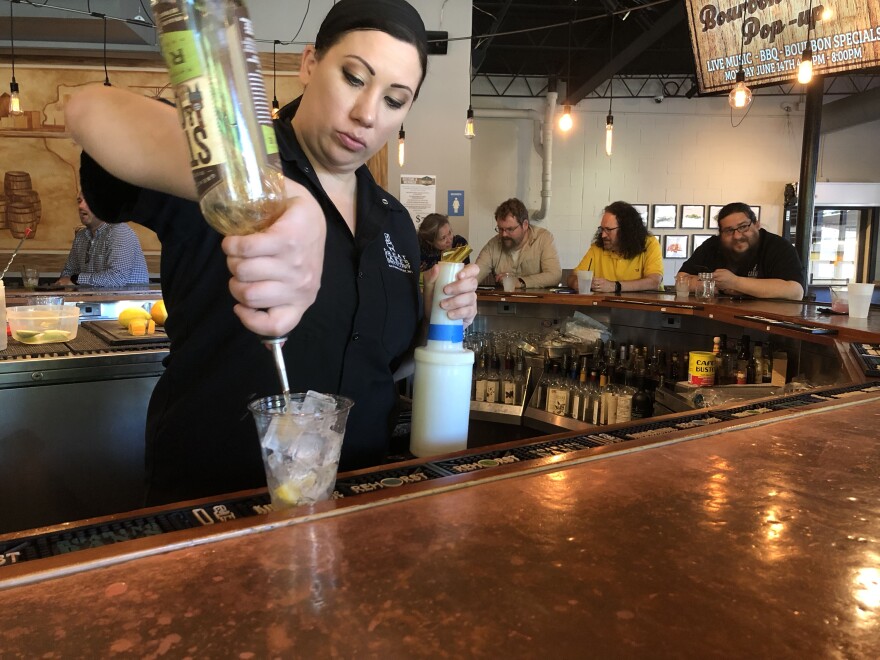Milwaukee is known as a city of breweries. But Salem Lakes resident Tom Targos has noticed another alcohol industry growing in Wisconsin.
"Over the past five to 10 years many distilleries popped up around Milwaukee. How, when and why did this trend start? Which ones were first? And how are they doing now?," Targos asked Bubbler Talk.
Across the U.S., craft distilleries are becoming more common, offering up locally-sourced vodka, gin and whiskey.
Wisconsin’s modern-day craft spirits boom started right here in Milwaukee, when Guy Rehorst opened Great Lakes Distillery in 2004.
The way Rehorst tells it, he was out to dinner one night when he realized you could buy Wisconsin-made beer and wine but not spirits.
"I figured there’s probably a good reason for that," he says. "I continued to dig and realized, there’s not a good reason for that. We have great grains here and obviously the water attracted brewers. There’s no reason you can’t make a great spirit here too."
It was the first Wisconsin distillery since prohibition. Rehorst says when he tried to sell his vodka to bars and restaurants they were confused.
"They’d look at me like I was a little a crazy," he says. "They’d frequently say, 'You’re making vodka in Milwaukee? Why would you do that?' So over time I think people have realized that craft spirits are here to stay and there’s a lot of interest in them, and despite Milwaukee having a reputation of a beer town, they enjoy a cocktail here too."

As Wisconsin’s first distillery in modern times, Rehorst fought to change restrictive laws. For example, tasting rooms weren’t allowed until 2009.
"I spent about four years involved trying to get that changed," he says. "Once it did, as you can see, it became a huge marketing opportunity for us and it’s helped us tremendously."
Rehorst helped clear a path for people like Evan Hughes, the cofounder of Central Standard Distillery, which opened in Milwaukee along with Twisted Path Distillery in 2014.
Hughes says Central Standard is popular for its Wisconsin-style old fashioned, made with brandy. Twisted Path Distillery specializes in organic spirits.
"And to my knowledge, there’s not another distillery that’s opened in Milwaukee since [2014]," Hughes says.
Milwaukee’s craft distillery market may be saturated. But more and more entrepreneurs are setting stills up around Wisconsin. For example, a distillery opened in Green Bay earlier this year, another one is expected to open in River Falls this fall.

Hughes and Rehorst are watching the trend.
"I think when [Central Standard] started there were 12," Hughes says. "I think we were the 12th. And now I think we’re up to 38 or 39."
Rehorst adds, "It looked like there were a lot in the planning stages too, so there’s probably going to be another 15 or so in the next two years. Like the brewing industry has gone through as well — there’s kind of a gold rush of people getting into the business."
Of course, craft distilleries aren’t unique to Wisconsin. You can go to pretty much any city, even some small towns, and find a locally made gin or bourbon. There are about 2,000 craft distilleries in the U.S.
Bubbler Talk question asker Tom Targos has his hypothesis.
"It goes along with that whole farm to table — maybe it’s farm to bar —movement that’s going on," he says.

Rehorst agrees. "I think it’s a natural progression," he says. "People have become more interested in what they’re consuming all over. Whether it’s food, whether it’s beer, soda, spirits. It’s a trend towards people becoming more aware of A) what they’re putting in their bodies and B) what they’re enjoying."
Rehorst says the COVID-19 pandemic hurt his business in some ways, but not others. The tasting room, which he says makes up about 40% of the distillery's profits, took a hit. He had to temporarily lay off staff. But alcohol sales remained robust.
"People were staying home more and drinking so our sales in the wholesale end increased," Rehorst says."So we've been busy the whole time producing and working on product."
Central Standard has been in the process of building a new facility downtown, so Hughes says the tasting room side of his business happened to be closed during the height of the pandemic. The new location is set to open in July.
Rehorst and Hughes say now that COVID restrictions have eased in Milwaukee, they’re looking forward to seeing more people in their tasting rooms and patios this summer.
Have a question you'd like WUWM to answer? Submit your query below.
_







